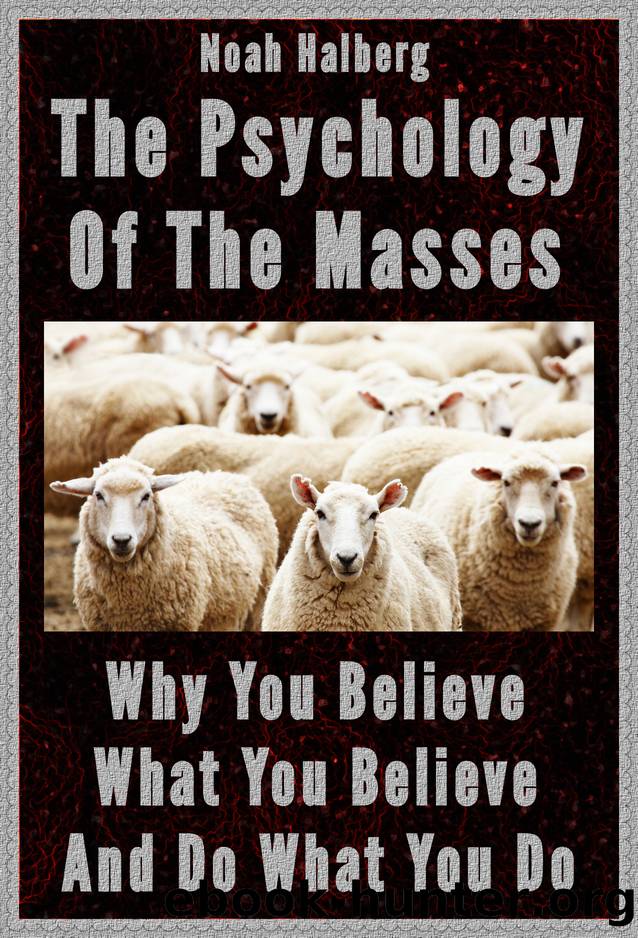The Psychology of the Masses: Why You Believe What You Believe and Do What You Do by Halberg Noah

Author:Halberg, Noah [Halberg, Noah]
Language: eng
Format: epub
Publisher: Unknown
Published: 2013-06-26T16:00:00+00:00
Cha
pter 6: The Kinds of Crowds
Cajolers, Special Pleaders, and Mascots
In his book the Crowd in Peace and War Sir Martin Conway (1915) also talks about the different kinds of crowd leaders. There are three: the crowd-compeller, the crowd-exponent, and the crowd-representative. The first type he discusses is the crowd-compeller. These are dominant personalities who come up with fantastic ideas which they force upon everyone else.
One quality that a crowd-compeller needs is foresight. He needs to be able to foresee difficulties and be able to provide against them. The type of foresight which he needs is not the foresight as to what might happen but the foresight as to what he can cause to happen with the human organism under his control.
Conway says that orators commonly belong to the crowd-exponent class, although a crowd-compeller can be a great orator. A crowd-exponent believes what he tries to get the crowd to believe, and feels as the crowd feels; he is carried away by them. The crowd-compeller moves others but is himself unmoved. Conway says that the greatest crowd-compellers are often not orators.
Conway talks more about how crowd-compellers impose their views upon the masses. Then he says that public opinion is created by a succession of crowd-compellers. He says that it is not the public that should be indicted for the actions of a nation but its crowd-compellers. He says that “[a]ll nations are natural born fools.”
Conway says that great crowd-compellers are rare in politics. It takes more than capacity for such a man to appear; he must also have the opportunity. If there had been no French Revolution Napoleon would never have become a great crowd-compeller. Conway thinks that Cecil Rhodes did not achieve his full potential. He thinks that Lord Kitchener might have great crowd-compelling abilities but that can only be revealed in the process of time. We know of course that Lord Kitchener never quite became a figure of the stature of Napoleon or Caesar. Winston Churchill appears to have been able to do it, but Conway, who was familiar with his early career, regards him as a crowd-exponent, not a crowd-compeller.
Conway doesn't doubt that crowd-compellers thrived in England on a smaller scale, though. He thinks that England has more men possessed of the power to lead men than perhaps any other country. He thinks the quality is hereditary, though it may be cultivated by education. He also thinks that “certain classes” possess more of it than others do. He says, naughtily by our standards, that the British subaltern “leads the Indian soldier as a sheep-dog controls a flock.”
I think that when the British empire still existed, there was a great demand for people with crowd-compelling leadership skills. There were all sorts of subjects all over the world who needed governing. I think the British declined in the number of their capable leaders after the empire was lost for the same reason. There just isn't a big demand for excellent leaders anymore. Or at any rate no big demand for crowd-compellers.
Download
This site does not store any files on its server. We only index and link to content provided by other sites. Please contact the content providers to delete copyright contents if any and email us, we'll remove relevant links or contents immediately.
Rewire Your Anxious Brain by Catherine M. Pittman(18644)
Talking to Strangers by Malcolm Gladwell(13349)
The Art of Thinking Clearly by Rolf Dobelli(10455)
Mindhunter: Inside the FBI's Elite Serial Crime Unit by John E. Douglas & Mark Olshaker(9324)
Becoming Supernatural by Dr. Joe Dispenza(8204)
Change Your Questions, Change Your Life by Marilee Adams(7760)
Nudge - Improving Decisions about Health, Wealth, and Happiness by Thaler Sunstein(7693)
The Road Less Traveled by M. Scott Peck(7594)
The Lost Art of Listening by Michael P. Nichols(7494)
Mastermind: How to Think Like Sherlock Holmes by Maria Konnikova(7323)
Enlightenment Now: The Case for Reason, Science, Humanism, and Progress by Steven Pinker(7306)
Win Bigly by Scott Adams(7184)
The Way of Zen by Alan W. Watts(6601)
Daring Greatly by Brene Brown(6504)
Big Magic: Creative Living Beyond Fear by Elizabeth Gilbert(5756)
Grit by Angela Duckworth(5605)
Ego Is the Enemy by Ryan Holiday(5415)
Men In Love by Nancy Friday(5234)
The Laws of Human Nature by Robert Greene(5173)
